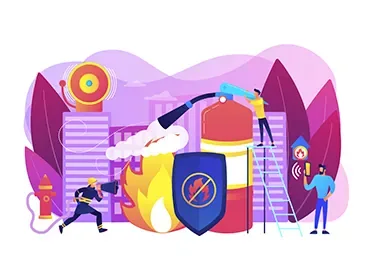A Fire Safety Audit is a systematic assessment of a building’s fire safety measures, compliance with standards, and preparedness to prevent and handle fire emergencies.
Fire Safety Audit
Fire Safety Audit
At PurityElec, we provide comprehensive Fire Safety Audits to ensure your facility is fully compliant with safety regulations and prepared to prevent, detect, and respond to fire hazards. Our audits are designed to protect lives, assets, and business continuity by identifying risks before they become emergencies.

What is a Fire Safety Audit?
A Fire Safety Audit is a systematic, detailed inspection of your workplace or facility to evaluate fire safety measures, emergency preparedness, and compliance with statutory requirements such as National Building Code (NBC) and local fire safety guidelines.
It helps answer key questions:
It helps answer key questions:
- • Are fire protection systems in place and functional?
- • Are escape routes and exits adequate and unobstructed?
- • Is staff trained for emergency response?
- • Are electrical systems safe and compliant?
Why is it Important?
Fires can cause irreversible damage, but most fire incidents are preventable with proper planning and regular audits.
A Fire Safety Audit helps you:
A Fire Safety Audit helps you:
• Detect potential fire hazards early
• Reduce the risk of property loss and downtime
• Ensure employee and occupant safety
• Avoid legal penalties for non-compliance
• Strengthen your organisation’s safety culture
Scope of Our Fire Safety Audit
Our team conducts a 360° evaluation covering:
1. Electrical Safety Checks – Identifying overloaded circuits, faulty wiring, and short-circuit risks
2. Fire Detection Systems – Smoke detectors, alarm panels, and early warning systems
3. Fire Suppression Systems – Sprinklers, extinguishers, hydrants, and gas-based suppression systems
4. Emergency Preparedness – Evacuation plans, signage, and assembly points
5. Escape Routes & Exits – Accessibility, lighting, and maintenance
6. Staff Training & Awareness – Fire drills and safety instructions
7. Compliance Verification – NBC, OSHA, and state-specific fire safety regulations
Our Process
1. Initial Consultation – Understanding your site layout, operations, and risk profile
2. On-Site Inspection – Thorough examination of fire safety systems and hazards
3. Risk Assessment Report – Detailed findings with severity levels and recommendations
4. Implementation Support – Guidance for corrective actions and compliance
5. Follow-Up Audit – Ensuring all improvements are in place and effective
Deliverables You Get
• Comprehensive Fire Safety Report with hazard analysis
• Compliance Checklist for regulatory bodies
• Recommendations for Risk Mitigation
• Training & Awareness Guidance
Why Choose PurityElec for Your Fire Safety Audit?
✅ Expert team with technical and regulatory expertise
✅ Industry-specific audit approach
✅ Detailed, easy-to-understand reports
✅ Practical, cost-effective solutions
✅ Commitment to safety and compliance
Ensure your facility is fire-safe before it’s too late.
Contact PurityElec today for a professional Fire Safety Audit and safeguard your people, property, and peace of mind.
Contact PurityElec today for a professional Fire Safety Audit and safeguard your people, property, and peace of mind.
Frequently Asked Questions
-
Q1. What is a Fire Safety Audit?
-
Q2. Why is a Fire Safety Audit important?It helps in identifying fire hazards, ensuring compliance with fire codes, safeguarding lives and property, and reducing insurance and legal risks.
-
Q3. Who requires a Fire Safety Audit?Industries, high-rise buildings, malls, schools, hospitals, hotels, offices, warehouses, and manufacturing plants.
-
Q4. How often should a Fire Safety Audit be conducted?Typically once a year, or as mandated by local fire authorities and safety regulations.
-
Q5. What areas are covered in a Fire Safety Audit?
- • Fire detection & alarm systems
- • Fire extinguishers, sprinklers, hydrants, and pumps
- • Emergency exits, signage, and lighting
- • Electrical wiring & equipment safetys
- • Storage of hazardous materials
- • Fire drills, training, and evacuation procedures
-
Q6. Does it only check firefighting equipment?No. It covers overall fire risk management, including building design, escape routes, staff awareness, and compliance with fire safety norms.
-
Q7. What fire safety standards are followed during the audit?
- • National Building Code (NBC)
- • NFPA (National Fire Protection Association) guidelines
- • Local Fire Department/Authority regulations
- • OSHA standards (where applicable)
-
Q8. How is a Fire Safety Audit conducted?
- • Review of documents & safety records
- • On-site inspection of fire systems & building layout
- • Identification of fire hazards & gaps in safety measures
- • Interviews with staff on awareness and training
- • Testing of alarms, pumps, extinguishers, and emergency systems
-
Q9. What deliverables do we get after the audit?A comprehensive report with:
- • Fire risk assessment findings
- • Gaps in compliance with standards
- • Recommendations for corrective actions
- • Emergency response plan improvement suggestions
-
Q10. Who is authorized to conduct a Fire Safety Audit?Certified fire safety professionals, safety auditors, or agencies approved by government fire departments or accredited safety councils.
-
Q11. What are the benefits of an Energy Fire Safety Audit?
- • Reduced risk of fire incidents
- • Improved employee & occupant safety
- • Better compliance with laws and insurance requirements
- • Enhanced readiness for emergencies
- • Protection of assets and reputation
-
Q12. Is a Fire Safety Audit mandatory?Yes, in many jurisdictions (especially for high-rise buildings, hospitals, malls, and industries), fire audits are mandatory as per Fire Service Acts, Factories Act, or NBC guidelines.

